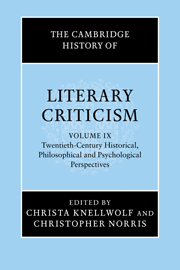Book contents
- Frontmatter
- Introduction
- HISTORY
- MARXISM AND POST-MARXISM
- FROM CULTURAL POETICS TO CULTURAL STUDIES
- PSYCHOANALYTIC APPROACHES
- GENDER AND SEXUALITY
- COLONIALISM, POST-COLONIALITY, NATION AND RACE
- MODERNITY AND POSTMODERNISM
- PHILOSOPHY, AESTHETICS AND LITERARY CRITICISM
- INTERDISCIPLINARY APPROACHES
- Bibliography
- Index
Introduction
Published online by Cambridge University Press: 28 March 2008
- Frontmatter
- Introduction
- HISTORY
- MARXISM AND POST-MARXISM
- FROM CULTURAL POETICS TO CULTURAL STUDIES
- PSYCHOANALYTIC APPROACHES
- GENDER AND SEXUALITY
- COLONIALISM, POST-COLONIALITY, NATION AND RACE
- MODERNITY AND POSTMODERNISM
- PHILOSOPHY, AESTHETICS AND LITERARY CRITICISM
- INTERDISCIPLINARY APPROACHES
- Bibliography
- Index
Summary
This volume of The Cambridge History of Literary Criticism is the last in a series of nine offering a scholarly survey of criticism and theory from classical antiquity to the present. Such a broad historical overview shows that the partiality of critical judgement has been recognised for almost as long as literature has existed; so much so, indeed, that the conscious attempt to make allowance for it marks the emergence of literary criticism as a discipline that seeks to achieve a certain judicious objectivity of viewpoint while perforce acknowledging its own dependence on rhetoric and strategies of persuasion. In the late twentieth century, moreover, critics have become so keenly aware of the cultural and ideological factors informing every act of interpretation that any claim to offer a fairly unbiased (let alone neutral or objective) survey of the field now seems more problematic than ever. Still it is essential to a project like this that such qualms should not be allowed to paralyse judgement or leave every sentence hedged around with qualifying doubts. As a matter of broad editorial policy, we have decided that the problem can best be confronted through a detailed discussion of historical context and emergent patterns of influence, along with a willingness to address such issues explicitly where need arises.
The guiding principle of Volume 9 is a sustained engagement with history, both in the sense that it raises issues of a markedly critical-historiographic import, and also in so far as it offers case studies of various historically situated movements and schools of thought. The last three volumes in the series are all concerned with twentieth-century developments, a weighting that might seem somewhat excessive, given the sheer chronological range of the series as a whole. However these volumes are strongly contrasted in terms of their distinctive emphases and governing interests.
- Type
- Chapter
- Information
- The Cambridge History of Literary Criticism , pp. 1 - 14Publisher: Cambridge University PressPrint publication year: 2001

